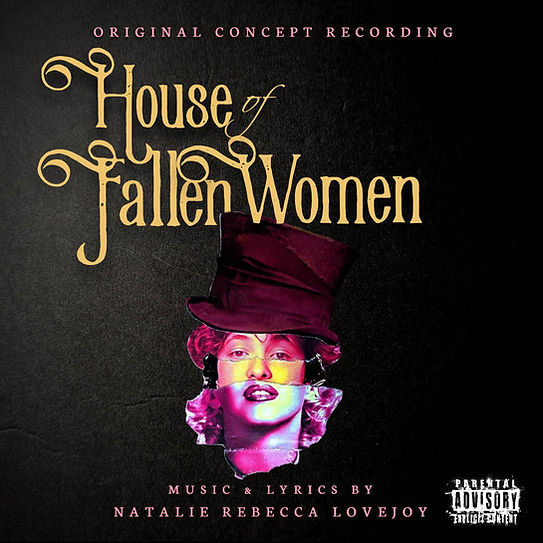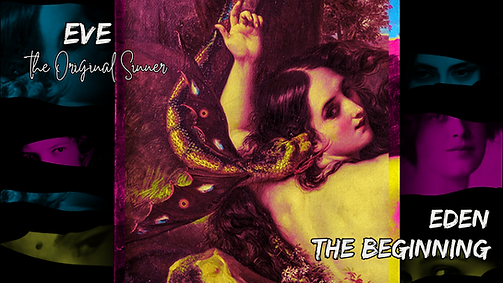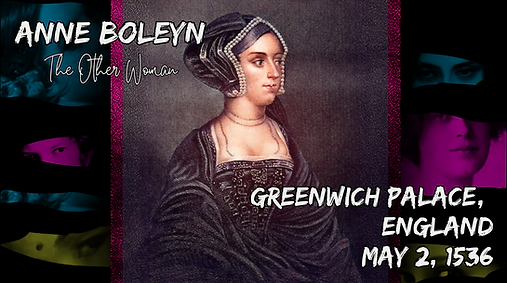
NATALIE REBECCA LOVEJOY
A New Musical About the Women Your Mother Warned You About
House of Fallen Women is an original new musical that explores women’s sexual liberation through the stories of historical women whose ambition, defiance, or desires cast them as cautionary tales or erased them from history entirely. It asks: what really makes the “fallen woman” so threatening?

House of Fallen Women: Original Concept Recording is now available on all major streaming platforms.
PHOTOS

Photos from the House of Fallen Women Album Release Concert at the Laurie Beechman Theatre, October 14, 2025.
Photography by Matt Carr
VIDEO CLIPS
House of Fallen Women Clips - Live at the Beechman in New York
House of Fallen Women Clips - Live at the Beechman in New York


Welcome to the House of Fallen Women

"The Way the Story Goes" (Excerpt)

"Original Life" (Excerpt)
CHARACTERS and SONGS
(in order of appearance)
.png)
"The Way the Story Goes"
Eve, the “first woman" of the Bible, unleashes her frustration in the opening number, "The Way the Story Goes.” In the song, she exposes how her narrative has been distorted and invites the audience to reimagine it through the telling of the experiences of women throughout history - her "daughters"! - who've shared her fate.
"Original Life"
Zelda Fitzgerald is a spirited young girl yearning for a life beyond conventionality and longing for uniqueness. When her mother tells her all women must choose between one of two paths - traditional or tragic - she expresses her desire to forge a path of her own in the song "Original Life."
.png)
.png)
"Only For A While"
Colette is a shy girl from the country living in early 20th-century Paris, stuck between societal norms and a restrictive marriage. Despite her sharp mind and love for writing, she is trapped by her domineering husband, who makes her write under his name. In "Only For A While," we see Colette's struggle as she wrestles with her longing for both love and personal freedom.
"Don't Talk, Evelyn"
Evelyn Nesbit is a young ingénue caught in the alluring world of early 20th-century New York City's elite. In the song "Don't Talk, Evelyn," she wrestles with the choice between silence and ambition, making her way in a world where her dreams hinge on the favor of powerful men.
.png)
.png)
"Patient A"
Louise Augustine Gleizes is a young woman trapped between the confines of societal expectations and her own sexuality and mental health challenges within the walls of Salpêtrière Hospital in Paris. The song "Patient A" chronicles her journey through a hysteric episode while in solitary confinement.
"Mrs. Force Astor Dick"
Titanic survivor Madeleine Force Astor Dick is a disgraced socialite, now navigating the tumultuous waters of early 20th-century societal expectations. The song "Mrs. Force Astor Dick" captures her courageous stand as she faces her abusive third husband in court, pleading for a divorce and the right to reclaim her identity.
.png)
.png)
"Untied Boat"
Xu Yuanji is a brilliant yet temperamental young poet wrestling with societal expectations and her own desires in ancient China. The song "Untied Boat" captures her emotional state after being cast aside by her husband for outshining his first wife. Xu Yuanji metaphorically likens herself to a boat set adrift, emphasizing that affection becomes conditional only when one conforms.
"Let Them Look At You"
Josephine Baker is a struggling chorus girl contending with both racism and jealous cast members in 1920's America when she's given the opportunity to have her big break in Paris. The song "Let Them Look at You" captures her internal struggle as she contemplates a daring topless solo dance that could both ruin her reputation and define her career.
.png)
.png)
"Nirvana Is Here"
Draupadi, a character from ancient Indian epic literature, unveils the intricate dynamics of polyandrous marriage with her five husbands to other characters who feel constrained by traditional roles. In the song "Nirvana is Here" Draupadi reflects on the liberation found in loving and being loved by multiple partners simultaneously, celebrating the diversity of intimacy and connection she experiences within her unconventional marital arrangement.
"Moonshine Like Mine"
Maggie Bailey is an independent and clever woman hailing from the rugged Appalachian mountains, where she crafts the finest moonshine known to the region. In "Moonshine Like Mine," Maggie celebrates the artistry and satisfaction of her craft, weaving tales of the smoothest brew and the pride that comes from being valued for her unique talents.
.png)
.png)
"Diamonds"
Lulu White is as a alluring and shrewd character living in New Orleans' Storyville district in the late 19th century. Her song "Diamonds" showcases Lulu's unapologetic perspective on her profession, drawing parallels between her role as a sex worker and the and the the societal expectations imposed on women.
"Follow Me"
Victoria Woodhull is a psychic medium who leaves her small midwestern town to run for President of the United States after specific instructions from her spirit guide. He tells her it is her destiny to advocate for social freedom and sexual emancipation for women, and she obeys, fearlessly challenging the societal norms of the restrictive 19th century America. The song "Follow Me" captures her first speech on free love, where she champions free love and the right of women to control their own bodies and desires.

"Voices"
Anne Boleyn is the unapologetically sharp-tongued and self-determined second wife of Henry VIII fighting with the impending threat of arrest on the eve of her downfall. In the song "Voices," Anne is consumed by fear and panic, torn between her inner warnings of danger and the societal gaslighting which causes her to doubt herself.
.png)
.png)
"They Say I'm a Witch"
Agnes Waterhouse is a widow living on the edge of town accused of witchcraft during trials of 16th-century England with facing accusations that threaten both her life and her daughter's. In the song "They Say I'm a Witch," Agnes vehemently denies the charges against her, confronting the injustice and hysteria gripping the town, and gradually realizing that, amidst the chaos, she in fact does possesses powers that transcend the ordinary realm
"If I Had a Daughter"
Marilyn Monroe is portrayed near the end of her life as she makes peace with who she is versus who the public wants her to be. In the her song "If I Had a Daughter," Marilyn reflects on the wisdom she would impart to a hypothetical daughter, imagining moments of guidance and intimacy that she yearned for but never experienced.
.png)
.png)
"Where the Mind Is"
Mary Magdalene is a steadfast and spiritually attuned character, defiant in the face of skepticism and judgment from the other disciples. In the song "Where the Mind Is," Mary asserts her truth, disregarding the doubt and potential slander from the other apostles regarding her special teachings from Jesus.















